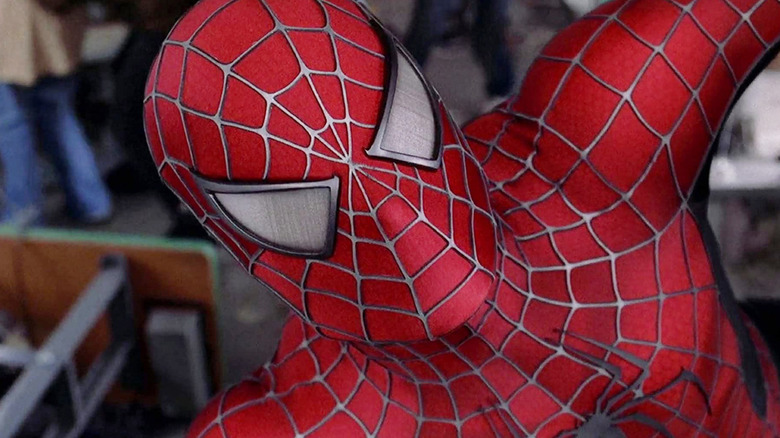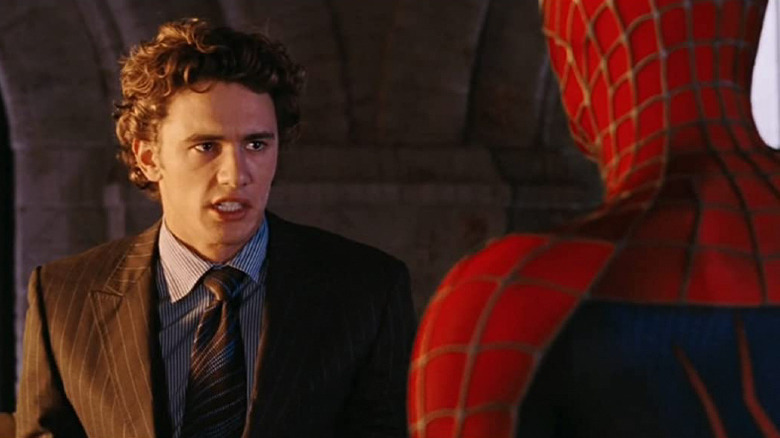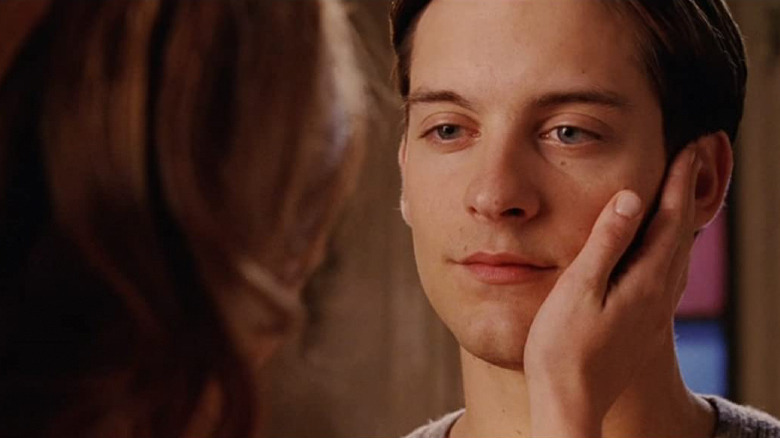Spider-Man 2 Ending Explained: Everybody Loves A Hero
Slapstick horror films, soapy superhero movies, zany westerns, intense crime-thrillers, romantic sports dramas — in a career that spans more than 40 years, there's very little Sam Raimi hasn't tried his hand at directing (to say nothing of his prolific output as a producer). But what, exactly, makes a movie a Sam Raimi movie? Is it the horror elements? The hyper-dynamic camera shots? The off-kilter comedy? The protagonist giving up the thing they've always wanted, having come to see the error of their selfish behavior?
To all that, I would say ... yes.
Few Raimi movies utilize these motifs quite as successfully as "Spider-Man 2," a film many critics still rank as one of the best (if not the best) superhero movies ever made. The 2004 sequel to Raimi's "Spider-Man" picks up with Peter Parker (Tobey Maguire) as a 20-year-old who, like many people at that age, is a mess. Struggling to balance his superhero duties with school and paying rent (cue Pete's landlord, Mr. Ditkovitch, yelling "RENT!"), Peter barely has time for his would-be girlfriend Mary Jane Watson (Kirsten Dunst) anymore. Meanwhile, his pal Harry Osborn (James Franco) wants to kill Spider-Man, believing the web-slinger is responsible for his father's death, and Harry is angry at Peter for refusing to help him. Also, Peter's poor Aunt May (Rosemary Harris) is facing eviction and still blames herself for Uncle Ben's murder.
One could say, when it comes to Peter's future, hope dangles on a string – even before well-intentioned scientist Otto Octavius (Alfred Molina) inadvertently transforms himself into the super-villain Doctor Octopus. When push comes to shove, though, "Spider-Man 2" isn't a film about Peter punching Doc Ock in the face (although he does that a lot in the movie). It's a story about how everybody loves a hero, but actually being one is quite tough.
With great power yadda yadda yadda
Most of the characters in "Spider-Man 2" know what they want, yet either fail or refuse to reflect on how their desires might affect those around them. In Peter's case, he justifies his decision to quit being Spider-Man by reasoning (re: lying to himself) that New York City will be fine without him, and he'll never be at peace with his complicity in Ben's death anyway. Harry, on the other hand, never once seems to consider that killing Spider-Man might not be great for the public regardless of his role (or lack thereof) in the death of Harry's father, Norman. It's only upon learning who Spidey is that Harry even begins to question whether he's been in the wrong this whole time.
Ultimately, actually talking to others about his feelings (the horror!) proves to be the key to Peter's salvation. By telling May the truth about the night Ben died, Peter not only frees his aunt from a burden that isn't hers to bear, but he indirectly confirms what she already suspected or knew about his secret identity. This, in turn, allows her to repay the favor by delivering her famous "Hero" monologue, motivating her nephew to resume his web-slinging heroics by reminding him that being a hero sometimes means giving up "the thing we want the most. Even our dreams."
Sadly, however, Harry doesn't have a loving relative to guide him. All he has is the ghost of his father and the toxic lessons Norman passed down, which also leads to Harry uncovering the dark secret Norman kept very literally hidden away from the world. Even so, by choosing to continue pursuing the thing he desires most (revenge) no matter the consequences, it's Harry and Harry alone who completes his evolution into a pumpkin bomb-chucking baddie.
'Go get 'em, tiger'
The choice between being selfless and doing what you want similarly acts as the crux of Doc Ock's arc in "Spider-Man 2." After spending most of the film firmly under the control of his malfunctioning robotic tentacles (starting with a "birth" scene that finds Sam Raimi in full-fledged horror mode), Dr. Octavius finally regains his agency with a little help from Peter in the climax. By nudging the doctor in the right direction with May's advice, Peter empowers Octavius to prevent his fusion power project from destroying New York City, even at the expense of his own life.
But what of Mary Jane? If anything, her storyline holds the key to understanding what "Spider-Man 2" is all about. Over the course of the film, Mary Jane is left struggling to make heads or tails of Peter's erratic behavior, even as she strives to make a life for herself. It's only when she finally learns the truth about Pete's alter ego that Mary Jane can even make her own big choice: Enter a picture-perfect if emotionally-unsatisfying marriage with her fiancé (no way that could end badly, right?), or try to make a relationship with Peter work, knowing it could easily fall apart.
Of course, Mary Jane chooses the latter and cheers Peter on ("Go get 'em, tiger") as soon as he's called into action as Spider-Man again. The film then ends with a closeup of Mary Jane watching Pete swing away, a look of uncertainty on her face. It's a downbeat visual that speaks the unspoken truth the rest of the movie has avoided explicitly stating up until then: There's never a guarantee things will work out, no matter which path you take. Talk about a meaningful note for a silly, splashy blockbuster to go out on.


